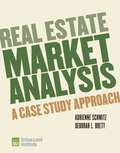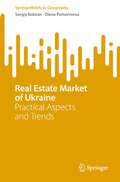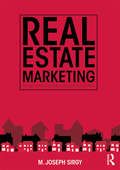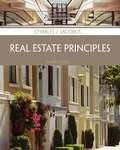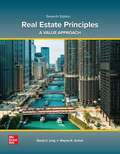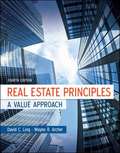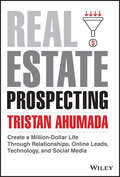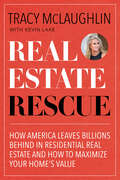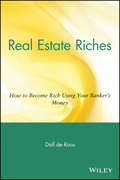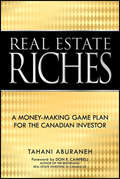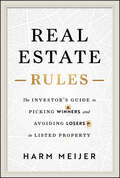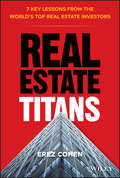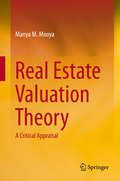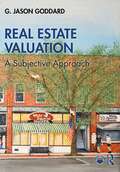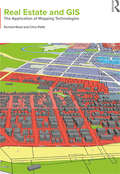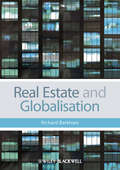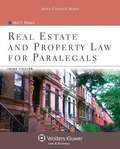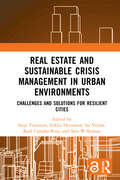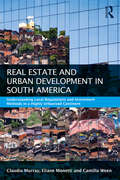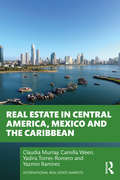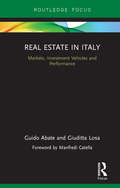- Table View
- List View
Real Estate Market Analysis: Methods And Case Studies,
by Adrienne Schmitz Deborah BrettOffering the tools needed to evaluate trends and understand key factors affecting the real estate market, this book explains how to get started, where to get information, and how to apply the basic techniques to a variety of development types. <P><P>This practical primer offers a step-by-step approach to developing property--whether public or private sector--and shows how market-analysis methods have been employed in real projects. <P><P> The 13 case studies written by top market analysts provide models that can be applied to multifamily, hotel, office, industrial, entertainment, mixed-use, and/or master-planned communities. This is an excellent reference for real estate students and professionals to maximize potential in a troubled market.
Real Estate Market Analysis: Methods and Case Studies
by Adrienne Schmitz Deborah L. BrettOffering the tools needed to evaluate trends and understand key factors affecting the real estate market, this book explains how to get started, where to get information, and how to apply the basic techniques to a variety of development types. This practical primer offers a step-by-step approach to developing property--whether public or private sector--and shows how market-analysis methods have been employed in real projects. The 13 case studies written by top market analysts provide models that can be applied to multifamily, hotel, office, industrial, entertainment, mixed-use, and/or master-planned communities. This is an excellent reference for real estate students and professionals to maximize potential in a troubled market.
Real Estate Market Analysis: Trends, Methods, and Information Sources
by Deborah L. BrettMaximize opportunities and minimize risk with this practical guide for analyzing real estate markets. Whether you are a developer considering the suitability of a location, a lender evaluating financial feasibility, a planner gauging the best land uses for a community, or a public official reviewing proposals and incentives, this book explains how to assess development potential. Packed with illustrations and examples, you will learn how to define market areas, inspect proposed development sites, evaluate competitive properties, analyze supply and demand; find and interpret economic and demographic data; and understand the unique characteristics and trends affecting residential, retail, office, hotel, industrial, and mixed-use property types.
Real Estate Market of Ukraine: Practical Aspects and Trends (SpringerBriefs in Geography)
by Sergiy Kobzan Olena PomortsevaThis book shows examples of basic approaches in real estate market analysis. Of value is the method of modeling the most attractive location of real estate, which is illustrated by a specific example. The authors give examples of real estate market research using GIS. The book analyzes the trends and prospects of real estate market development both in the pre-war and in the post-war period in Ukraine. It provides factors, trends, and development of the real estate market-directed investments. This book is useful to investors, real estate appraisers, real estate market researchers, GIS specialists, developers, researchers, graduate students, and students.
Real Estate Marketing: Strategy, Personal Selling, Negotiation, Management, and Ethics
by M. Joseph SirgyReal Estate Marketing is specifically designed to educate real estate students with the art and science of the real estate marketing profession. The ideal textbook for undergraduate and graduate level classes in business school and professional / continuing education programs in Real Estate, this book will also be of interest to professional real estate entrepreneurs looking to boost their knowledge and improve their marketing techniques. The book is divided into five major parts. Part 1 focuses on introducing students to fundamental concepts of marketing as a business philosophy and strategy. Concepts discussed include strategic analysis, target marketing, and the four elements of the marketing mix: property planning, site selection, pricing of properties, and promotion of properties. Part 2 focuses on personal selling in real estate. Students will learn the exact process and steps involved in representing real estate buyers and sellers. Part 3 focuses on negotiations in real estate. How do effective real estate professionals use negotiation approaches such as collaboration, competition, accommodation, and compromise as a direct function of the situation and personalities involved in either buying or selling real estate properties? Part 4 focuses on human resource management issues such as recruiting and training real estate agents, issues related to performance evaluation, motivation, and compensation, as well as issues related to leadership. Finally, Part 5 focuses on legal and ethical issues in the real estate industry. Students will learn how to address difficult situations and legal/ethical dilemmas by understanding and applying a variety of legal/ethical tests. Students will also become intimately familiar with the industry’s code of ethics.
Real Estate Modelling and Forecasting
by Chris Brooks Sotiris TsolacosAs real estate forms a significant part of the asset portfolios of most investors and lenders, it is crucial that analysts and institutions employ sound techniques for modelling and forecasting the performance of real estate assets. Assuming only a basic understanding of econometrics, this book introduces and explains a broad range of quantitative techniques that are relevant for the analysis of real estate data. It includes numerous detailed examples, giving readers the confidence they need to estimate and interpret their own models. Throughout, the book emphasises how various statistical techniques may be used for forecasting and shows how forecasts can be evaluated. Written by a highly experienced teacher of econometrics and a senior real estate professional, both of whom are widely known for their research, Real Estate Modelling and Forecasting is the first book to provide a practical introduction to the econometric analysis of real estate for students and practitioners.
Real Estate Principles
by Charles J. JacobusFor decades this popular principles book has laid a solid foundation for thousands of new real estate professionals like you starting a rewarding career in the real estate industry. <P><P>Known for his clear presentation and engaging style, Charles Jacobus brings together all the pieces of real estate giving you the fundamentals they need for success. <P><P>This best-selling principles book has been updated to reflect numerous changes in modern real estate practice. <P><P>Particular attention has been given to new regulations in the mortgage industry while still reinforcing the core concepts that have been the cornerstone of American real estate ownership.
Real Estate Principles: A Value Approach
by David C. Ling Wayne R. ArcherReal Estate Principles: A Value Approach demonstrates how value is central to virtually all real estate decision-making. Students using Ling and Archer should finish the course with a value-oriented framework and a set of valuation and decision-making tools that can be applied in a variety of real-world situations. The key to making sound investment decisions is to understand how property values are created, maintained, increased, or destroyed. Since the launch of Real Estate Principles: A Value Approach, significant and lasting changes have come upon the world of real estate. This is very true in real estate finance and capital sources where most of the traditional lenders have been transformed or displaced, giving way to a radically different set of players in mortgage finance. There has been change with profound and far-reaching implications in a world where it is understandable that property values can go down as well as up. This realization will color every aspect of real estate investment, finance and transactions for the foreseeable future.
Real Estate Principles: A Value Approach
by David Ling Wayne ArcherReal Estate Principles: A Value Approach demonstrates how value is central to virtually all real estate decision-making. Students using Ling and Archer should finish the course with a value-oriented framework and a set of valuation and decision making tools that can be applied in a variety of real-world situations. The key to making sound investment decision is to understand how property values are created, maintained, increased or destroyed. <p><p> Since the launch of Real Estate Principles: A Value Approach, significant and lasting changes have come upon the world of real estate. This is very true in real estate finance and capital sources where most of the traditional lenders have been transformed or displaced, giving way to a radically different set of players in mortgage finance. There has been change with profound and far-reaching implications in a world where it is understandable that property values can go down as well as up. This realization will color every aspect of real estate investment, finance and transactions for the foreseeable future.
Real Estate Prospecting: Create a Million-Dollar Life Through Relationships, Online Leads, Technology, and Social Media
by Tristan AhumadaThe ultimate guide to real estate prospecting for both rookies and veterans In Real Estate Prospecting: Create a Million-Dollar Life Through Relationships, Online Leads, Technology, and Social Media, founder, consultant, and real estate team leader Tristan Ahumada delivers a comprehensive discussion of the resources and strategies available to rookie and experienced agents who wish to succeed at the highest levels of the industry. In the book, you’ll explore techniques used by leading agents to become the best brokers, agents, and team leaders they can be. From developing a championship mindset to setting up an unbeatable sales system, the author also explains how to: Create and take advantage of a powerful real estate lead database Use live, virtual, and hybrid connections to round out your strategy Network with precision and efficiency to make the most of your time and energyAn essential and exciting new resource from one of the masters of the real estate industry, Real Estate Prospecting is a hands-on demonstration of the tactics, strategies, and tools you need to master to become the best agent, sales leader, or broker in your region.
Real Estate Rescue: How America Leaves Billions Behind in Residential Real Estate and How to Maximize Your Home's Value
by Tracy McLaughlin Kevin Lake#1 New Release in Home Design Remodeling & Renovation - A Must-Read for Success in the Housing MarketThe advice you didn’t know you needed. Because most people only enter the real estate world once a decade or less, few really know how it works. The housing market elicits a lot of emotions, from excitement to anxiety. Oftentimes, this can blind us to the realities of how the market works. Top residential real estate agent Tracy McLaughlin is here to change our understanding of the home sale process. From those buying their first home to sellers with some experience, this book is packed with essential advice.A roadmap for buyers and sellers. In nearly all real estate sales, buyers and sellers leave behind thousands—or even hundreds of thousands to millions of dollars—on the table. As frightening as this reality is, it continually happens because one simple decision, among the countless made during the entire process, can greatly impact the outcome of the transaction.Bridging the gap between information and expertise. Because of the way technology has impacted real estate sales, buyers and sellers have greater access to information and even the ability to direct the sales process. While knowing market information is helpful in real estate sales, most people still lack a key aspect: expertise. By presenting an inside view on sales, McLaughlin provides a guide for maximizing the value of the sale and purchase of homes.In this book by real estate expert Tracy McLaughlin, readers will find…Detailed guidelines for how to save money and make moneyAdvice for finding the right real estate agentThe real estate for dummies book every home buyer or seller needsIf you’ve looked for guidance in books such as Dream Home, Nolo’s Essential Guide to Buying Your First Home, and Home Buying Kit For Dummies, then you’ll find more of what you’re looking for in Real Estate Rescue with Tracy McLaughlin.
Real Estate Riches
by Dolf De RoosAn all-time bestseller, Dolf de Roos?s classic Real Estate Riches shows you how to find great deals and make great profits in the real estate market. You?ll learn why real estate is such a reliable moneymaker and how to achieve the biggest return possible on your investment. Full of time-honored wisdom, proven tactics, and quick-and-easy tips, this book shows you how to find the best properties with the most potential, analyze deals, negotiate and submit offers, effectively manage properties, and dramatically increase the value of your real estate without spending much money. If you want to be your own boss and quit the nine-to-five life, Real Estate Riches shows you how.
Real Estate Riches
by Tahani AburanehIf there were one advantage that would make a significant impact on the growth of your real estate portfolio, what would that be?If you are just starting out as a real estate investor, what anxieties or worries might you have? What expertise in particular would help you understand market fundamentals and help you achieve your goal of becoming a successful investor and attaining financial freedom?If you're an experienced investor, what systems do you have in place to support your growth without making costly mistakes? Have you built up a proper support team?If you are a successful real estate agent, with experience in residential property, what could you do to enhance that success in both personal and professional growth? Have you thought about how real estate investing can help you and your business?The answer to these questions lies in a very special kind of relationship-the relationship between the real estate investor and the real estate agent.Real Estate Riches is designed to provide investors with insights into the skills and services that a knowledgeable agent can provide-one who specializes in meeting the needs of the investor by understanding the investor's mindset, vision, and goals to allow them to focus on the larger aspects of their business. Real Estate Riches is also intended to illustrate to the agent what an investor's business looks like-from the different strategies and types of properties the investor focuses on, to the specifics of investment towns, neighbourhoods and streets, to timelines and cycles for growing the investor's portfolio.How do you go about finding that agent with the requisite skills? The answer lies within the pages of Real Estate Riches. Filled with real-life case studies, tips, and the hard-won knowledge that comes from experience, the book is motivational, practical, and useful-and it will be among your wisest investments. "This book really shows professional investors and professional agents how, if done right, both parties can come out with better financial results with less hassle by treating the real estate business like any other business-creating long-term relationships in which each party respects the other's profession and treats each other's time like the important commodity that it is."- Don R. Campbell, Author, market analyst, and investor"Tahani is an inspiration. She shows firsthand how with the right mindset and the right team you can build a future in real estate while not compromising what's truly important."- Philip McKernan, Author of South of 49 and Fire Sale"Tahani's story is powerful, and demonstrates what can happen when you focus on helping people and living your passion. She reveals the 'human' side of real estate, and why it's so important to build a powerful team around you that you can trust."- Greg Habstritt, Founder of SimpleWealth.com and best-selling author of The Real Estate Secret"Tahani gives the novice investor a clear insight into the world of a savvy, investor-friendly real estate agent and the importance of having someone with her experience on your team. Whether you are a seasoned investor or just starting out, this book will be an invaluable tool in your investor toolbox."- Peter Kinch, Owner, DLC Peter Kinch Mortgage TeamTahani Aburaneh is donating the royalties from the sale of this book to www.care.org.
Real Estate Rules: The Investor's Guide to Picking Winners and Avoiding Losers in Listed Property
by Harm MeijerThe incisive guide of how to effectively invest in real estate and REITs In Real Estate Rules: The Investor's Guide to Picking Winners, Avoiding Losers in Listed Property, celebrated real estate investor Harm Meijer delivers a startlingly insightful and eye-opening roadmap to successful property investment. This book explains the golden rules of investing in European real estate companies, including Real Estate Investment Trusts (REITs). It's full of real-world examples and anecdotes drawn from the author's long and storied career in the industry. Real Estate Rules contains: Robust tools for making informed investment decisions and staying clear of the "vicious downward spiral of doom" Understanding market cycles and mastering the art of acting contrarian during downturns to maximize your investment How macro drivers, central bank moves and government stimuli can be game changers for real estate markets Techniques for assessing the management's value creation and its alignment with shareholders Insights to ensure a solid capital structure and avoid leverage traps in downturns Advice on how to navigate the European stock markets with its unique challenges for Real Estate Investment Trusts Real-world case studies illustrating these principles in action, highlighting key lessons for investors You'll also learn why acting on conviction, thorough research, strong relationships, and most importantly, trust are key to achieving lasting success. Perfect for Real Estate Investment Trust investors, people interested in investing directly in individual properties, and other market participants, Real Estate Rules is also a must-read for anyone involved in the real estate industry looking for an insightful investor perspective on the sector.
Real Estate Titans: 7 Key Lessons from the World's Top Real Estate Investors
by Erez CohenIn Real Estate Titans, Erez Cohen shares the advice and learnings of the world's leading real estate experts to create a guide for becoming a savvier real estate player. Cohen draws on his experience as a research and teacher’s assistant at Wharton Business School with an investment expert—and his mentor—Dr. Peter Linneman. Throughout his career, Cohen has collected first-hand knowledge from meetings with such real estate titans as Ronald Terwilliger, Sam Zell, Joseph Sitt, and numerous others. Cohen wanted to understand how these real estate giants became so successful, so he refined his quest into three critical questions: What inspires these titans to work so hard and reach such extraordinary levels of success? What are the main elements and traits inside of them that propel them to be so grandiose? How have these individuals, who had less resources, succeeded on a much bigger scale than so many of their competitors? Real Estate Titans contains the 7 key lessons distilled from interviews with several of the world’s greatest real estate investors. These critical lessons offer insight into the mindset, tactics, and habits that each of the interviewed titans possess. Once you implement these key ideas—which you won’t find anywhere else—into your business, it will grow exponentially within a matter of months. Real Estate Titans offers an insider’s view into several of the most successful investors on the planet. The book’s compelling stories and lessons show why real estate is such a wonderful and important business, and it also offers a roadmap for becoming a world class real estate player.
Real Estate Valuation Theory
by Manya M. MooyaThismonograph critically reviews and updates real estate valuation theory in lightof developments in heterodox economic theory. Building on a comprehensivehistorical account of the evolution of value theory, the book uses new institutionaleconomics theory and critical realism as lenses through which problems in standardvaluation theory and practice are expatiated, and as the foundation for analternative theory. The new theory is employed to explain major problems inreal estate valuation that are beyond the capability of the standard theory, whichhas its origins in neoclassical economics, such as price bubbles in real estatemarkets and valuation under uncertain market conditions.
Real Estate Valuation: A Subjective Approach
by G. Jason GoddardReal Estate Valuation: A Subjective Approach highlights the subjective valuation components of residential and commercial real estate, which can lead to a range of acceptable property value conclusions. It discusses the causes of housing booms and goes in depth into the heterogeneity of commercial real estate property valuation via examples from owner-occupied, multifamily residential, hotel, office, retail, warehouse, condo conversion, and mortgage-backed security areas of real estate. Other topics explored include the role of machine learning and AI in real estate valuation, market participant value perceptions, and the challenge of time in the valuation process. The primary theoretical basis for the range of acceptable values and the subjectivity of property valuation focuses on the work of G.L.S. Shackle from the Austrian School of Economics. This illuminating textbook is suitable for undergraduate and master’s students of real estate finance, and will also be useful for practitioners in residential and commercial real estate.
Real Estate and GIS: The Application of Mapping Technologies
by Richard Reed Chris PettitReal Estate and GIS focuses on the application of geographic information systems (GIS) and mapping technologies in the expanding property and real estate discipline. Whilst a thorough understanding of location is understood to be fundamental to the property discipline, real estate professionals and students have yet to harness the full potential of spatial analysis and mapping in their work. This book demonstrates the crucial role that technological advances can play in collecting, organising and analysing large volumes of real estate data in order to improve decision-making. International case studies, chapter summaries and discussion questions make this book the perfect textbook for property and applied GIS courses. Property and real estate professionals including surveyors, valuers, property developers, urban economists and financial analysts will also find this book an invaluable guide to the understanding and application of GIS technology within a real estate industry context.
Real Estate and Globalisation
by Richard Barkham2000 to 2010 was a remarkable decade for real estate. It started with the dot.com bubble and ended with the putative recovery from the Great Financial Crisis. The period in-between featured the world's first coordinated real estate boom and slump. This book is based on a series of briefings on the relationship between macro economic events and real estate markets in the era of globalisation that covered the period. Collectively they offer unique insights, new ideas and practical approaches to real estate economics, grounded in the day-to-day realities of investment, development and fund management operations in a leading international property company. All the briefings are based on research conducted by a sophisticated in-house research team with expertise in macroeconomics, urban economics, financial economics and econometrics, led by a well- known specialist in the field. The topics highlight the relationship between real estate markets and global economic and political events – an area not well covered by academic journals. A compelling introduction considers the dramatic boom and slump in real estate values that led up to the Great Financial Crisis. The briefings are then presented, grouped into broad themes: macro economics and real estate; GDP, recessions and inflation; REITs; construction; Asia; retail, offices and housing markets; the formation of investment yields. A final chapter considers the medium-term future for real estate in the context of the ongoing financial crisis. Topics span the key sectors of office, retail and residential real estate in over 40 countries, with a focus on private sector investment, development and management. The perspective is long term, reflecting Grosvenor's unique position in real estate as a privately owned group. The author provides a commentary on each topic, giving context to the research and the implications for strategy, drawing out two unifying themes: the effect of globalisation; and the importance of macro economics and geo-politics in real estate research. Together, the briefings offer a penetrating analysis of real estate markets in the era of globalisation and financial crises. The era of crises is far from over, and Real Estate and Globalisation provides invaluable insights for property professionals worldwide – developers, occupiers, investment analysts and planners – on the nature of the processes that create such intense property market volatility. The book is also a unique source of guidance on practical property research for final year undergraduates and postgraduates on property courses, as well in geography, planning, architecture, and construction.
Real Estate and Property Law for Paralegals
by Neal R. Bevans BevansReal Estate and Property Law for Paralegals provides a solid foundation in the basics including the practicalities of daily legal work. Its broad coverage of all the key topics that paralegals need to know includes basic elements of real property, different methods used to record and describe property, transfer of title, the rights associated with real estate ownership,elements of real estate contracts, landlord/tenant law, deeds, mortgages,restrictions on land use, title insurance and title examinations, the closing process, and tax implications. Practical skills are emphasized throughout the book so that students will develop a true understanding of what it is like to practice in the real world. An easy-to-read and engaging style utilizes numerous examples and illustrations, always emphasizing the practical nature of real estate law. Each chapter opens with objectives and closes with Key Terms, Review Questions, and Practical Applications exercises. In every chapter, an "Issue at a Glance" box summarizes important legal concepts, and"Skills You Need in the Real World" sections highlight particular paralegal skills. Marginal definitions; numerous figures, tables, and forms; and case excerpts that discuss legal theory and applications round out the significant pedagogy. Additionally, Websites that can help students gather more information are strategically placed. An in-depth Instructor's Manual includes a test bank, lesson plans, suggested syllabi, web resources, additional assignments and PowerPoint slides for each chapter. The revised Third Edition provides a wealth of updated forms and cases. New website references make the book current, and fine-tuned text discussions have been expanded where appropriate. A new interactive workbook is available at the website to accompany the book.
Real Estate and Sustainable Crisis Management in Urban Environments: Challenges and solutions for resilient cities
by Sara Wilkinson Saija Toivonen Sirkka Heinonen Ira Verma Raúl Castaño-RosaThe aim of this book is to promote the dynamic resilience of societies by identifying, analysing, and exemplifying the role of space and land use in both anticipated and unanticipated primary and secondary crisis situations. The book brings together the expertise of a unique team of researchers and methods from fields of futures studies, land use planning, social sustainability and wellbeing, architecture, spatial planning, design and real estate economics, and presents a novel understanding of the direct and indirect impacts of possible crises in the space and land use context. It goes on to discuss the concept of resilience and exemplifies potential solutions and offers a holistic and forward-looking approach for crisis management through a lens of social sustainability and wellbeing, making an important contribution to the promotion of wellbeing in the built environment, especially in terms of land and residential space and building use. This book does not only identify barriers and successful incentives in resilient crisis management but also discusses the role of different stakeholders (e.g., households, office workers, real estate owners, space occupants, firms, the public sector, etc.) in crisis management. Finally, international case studies aiming to tackle the challenging landscape of future threats are presented, along with novel tools to support the development of future policies, regulations, and management practices in the built environment, which can increase the dynamic resilience of societies. Overall, this book is essential reading for decision-makers in the public and private sectors, urban developers, space and spatial designers, architects, planners, community stakeholders, real estate investors, facility managers and crisis and corporate responsibility managers.
Real Estate and Urban Development in South America: Understanding Local Regulations and Investment Methods in a Highly Urbanised Continent (Routledge International Real Estate Markets Series)
by Camilla Ween Claudia Murray Eliane MonettiReal Estate and Urban Development in South America uncovers how investors are navigating South American real estate markets in commercial, residential and infrastructure development. A preferred location for real estate development during the colonial era, in recent decades South America has been seen as high-risk for global real estate investors. This book explores the strengths and weaknesses of real estate markets in the region, concluding that with careful implementation of the correct development strategies, the region can once again take its place at the centre stage of global real estate investment. Comparing the economics and market maturity of South American countries in turn, the authors draw out the particular contexts in which investors and developers operate in mature and emerging markets. Bridging the gap between theory and practice, analysis of local development policies, legislation, valuation methods and taxation is supplemented with case studies from key players in the region’s major cities. The first full overview of real estate markets in South America, this book will be an essential guide for investors, policy makers, academics and students with an interest in this this rapidly evolving region.
Real Estate in Central America, Mexico and the Caribbean (Routledge International Real Estate Markets Series)
by Camilla Ween Claudia Murray Yadira Torres-Romero Yazmin RamirezThis book examines real estate markets and urban development in Central America, Mexico and The Caribbean (CAMEC). It considers both residential and commercial real estate with a focus on industrial and hospitality sectors, infrastructure and logistics. The CAMEC region is besieged by complexity. Prone to natural disasters, and with the Mexico/US border constituting the largest human migration corridor on Earth, the region is also a vital trading hub for goods, linking commerce between the world’s two largest oceans and the Americas. The real estate markets in this area are dynamic, rapidly developing and under researched. This book analyses the particularities of these markets and the context in which investors and developers operate. The authors present case studies and contributions from key players in major cities in the region. The book exposes the regional risks and opportunities connected to urban development including market transparency, urban equity and development regulation. The research presented in this volume gives the reader a comprehensive picture of each country under study, detailing their individual commercial, residential, industrial, leisure and infrastructure sectors. This is essential reading for international investors, real estate students, researchers, and professionals with an interest in the region.
Real Estate in China: A Technical Note for SOHO China
by Charles F WuA technical note on the state of Chinese commercial real estate and the effects of China's slowing growth. This note was written in conjunction with the case study "SOHO China: Transformation in Progress."
Real Estate in Italy: Markets, Investment Vehicles and Performance (Routledge International Real Estate Markets Series)
by Giuditta Losa Guido AbateThis in-depth case study evaluates the recent evolution of the Italian real estate market, which has lately been subject to two interlocking phenomena: a serious devaluation of physical assets and, at the same time, a deep legislative innovation of the vehicles investing in this asset class. The novelty of the legal framework of some of the Italian real estate investment vehicles and the recent developments in the market make this detailed analysis a fascinating addition to the literature. The book starts with an analysis of the Italian real estate sector, covering the evolution and performance in light of the economic crisis and the most recent legislative innovations. Italian real estate investment vehicles are then compared with a broader European perspective. Each Italian investment vehicle (real estate investment funds, real estate fixed capital investment companies and real estate investment trusts) is then analysed in both legal and financial details, providing insights into management structure, the rights and powers of investors, the typical investment process and the related costs. The different management models are then compared in order to assess their advantages and disadvantages, especially for institutional investors. The performance measurement of Italian closed-end alternative investment funds and the phenomenon of discount to net asset value for listed real estate investment funds are then subject to a theoretical and empirical examination.

